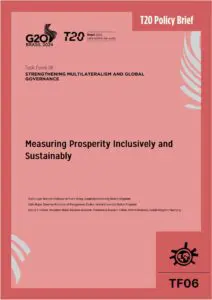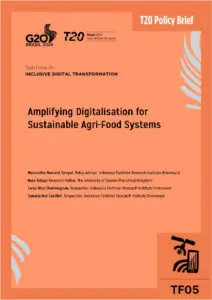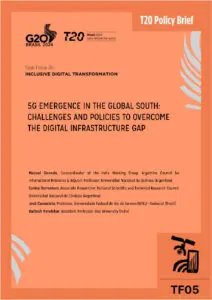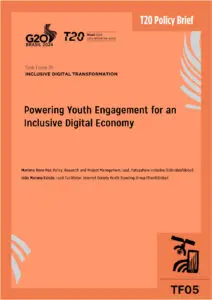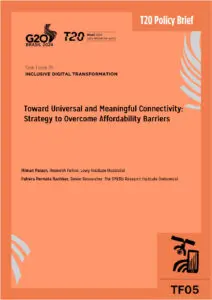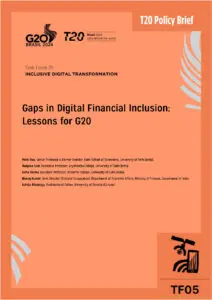The Group of 20 (G20) has a proven record of multi-stakeholder engagement, exem plified by groups such as the Business 20 (B20), Civil Society 20 (C20), and Think 20 (T20). However, the evolution of this engagement has been ad hoc, the scope limited, the impact inchoate, and the results inconsistent. This brief calls for a systematic reconsideration and expansion of the G20’s multi-stakeholder engagement, first by an audit of existing structures. In addition, a “light-touch” secretariat should be established to better coordinate state and non-state actors. This way, both the legitimacy and effectiveness of the G20 could be increased.
Challenge
Multilateralism is suffering. While transnational challenges like climate change, digitalization, and migration exceed individual states’ capacity to tackle them, protectionism and nationalism have experienced an upsurge in many of the world’s regions. At the same time, the US, a long-term supporter of free trade and global security, is in retreat, and its president has become a “disrupter-in-chief.” This was demonstrated at the height of the COVID-19 pandemic when the Trump administration suspended its funding of the World Health Organization. The somewhat paradoxical result of the aforementioned trends is that we are witnessing a growing global governance gap at a time when collective action is needed the most. This was the case even before the COVID-19 pandemic and has only been exacerbated as a result. As if in a downward spiral, the inability of the international community to deliver on many of the world’s most pressing issues has led many citizens to lose trust in international organizations and governments alike.
In the interconnected world of the 21st century, when strong multilateralism benefits everyone from governments to non-state actors and citizens, it is high time for multilateral cooperation to take the forefront again. Multilateral formats need to be revived to tackle the challenges that citizens are confronted with. This policy brief outlines one possible route. It focuses on the potential for the G20 to partner with non-state actors like civil society organizations (CSOs) or private companies to address global challenges collectively, make global governance more effective, and bolster the G20’s legitimacy.
Multi-stakeholder initiatives, or other formats in which state and non-state actors co operate, have long formed part of global governance discourse and action. In fact, engagement with these initiatives has been a part of the G20’s framework since it was upgraded from the ministerial to leaders’ level in 2008. It is now institutionalized in the form of “engagement groups,” defined as “independent collectives that are led by organizations from the host country [and which] work with other organizations from G20 countries to develop policy recommendations that are formally submitted to G20 leaders for consideration” (G20 n.d.). When combined with one of its other core strengths—its flexible and non-bureaucratic format—the G20 is in a strong position to reflect upon, develop, and enhance its engagement with non-state actors. The goal here should be increasing the efficiency and effectiveness of multilateral cooperation at a time when global challenges are too onerous to be carried by states alone.
The specific challenges that emerge are how can the G20 do this in a systematic and constructive way while maintaining its strengths of informality and flexibility? How can it take the continuing centrality of states into account while respecting the specific traits of non-governmental organizations (NGOs) and private companies? Ultimately, how can we ensure that the G20’s engagement groups are more than mere window-dressing and instead function effectively to plug the global governance gap identified above and benefit everyone?
Proposal
To revitalize the multilateral system of global cooperation for everyone’s benefit, the G20 should critically reflect upon and revamp its partnerships with non-state actors like CSOs and private companies. The existing engagement groups within the G20 process represent the obvious starting point for this undertaking. Specifically, the G20 should take these consultative processes seriously, consider the whole of the policy cycle when engaging with non-state actors, create appropriate supporting structures, and walk the talk when it comes to multi-stakeholder cooperation.
The state of multi-stakeholder cooperation with the G20
Multi-stakeholder governance assumes that an effective governance of global commons like climate, digitalization, and global health requires cooperation among various groups of stakeholders constituting state and non-state actors. Unlike multilateralism, which considers governments to be the exclusive governors, multi-stakeholderism makes stakeholders the central actors (Glekman 2018, xiii). Multi-stakeholder cooperation has been defined as “two or more classes of actors engaged in a common governance enterprise concerning issues they regard as public in nature, and characterized by polyarchic authority relations constituted by procedural rules” (Raymond and Denardis 2015, 573).
Similarly, the idea of “inductive governance” was introduced into the T20 discourse several years ago as a “bottom-up mode of organising global collective action, so that the identification of the issues to be addressed at the global level, the content of the international agreements reached and the follow-up of their application at the national level rely on the initiative and active participation of non-governmental and subnational actors” (Ortega, Pérez, and Saz-Carranza 2018, 4; see Ortega 2015). The underlying consideration of either label is that many global challenges are too onerous to be managed by states alone.
The G20’s outreach and engagement structures resonate with this idea by marshaling the collective resources of various stakeholders in G20 member countries. Business communities, academic institutions, CSOs, and many others provide invaluable knowledge on their sectors and the challenges on the ground. There are currently eight G20 engagement groups—the B20, C20, Labor 20 (L20), Science 20 (S20), T20, Urban 20 (U20), Women 20 (W20), and Youth 20 (Y20). There has even been a second and unofficial G20 in the form of the G(irls) 20. [1]
Although their origins may differ, “[t]he importance of these transnational policy net works rest [sic] upon their role in developing and disseminating G20 policy priorities and principles; and are an attempt to enhance the legitimacy and influence of the G20 and its policy proposals” (Slaughter 2015, 171). In other words, the benefits ought to be mutual. Non-state actors voice their ideas within the G20 process while the G20 itself benefits from their expertise, more positive perceptions, and greater legitimacy.
However, in the absence of a consistent set of rules or principles, as well as a coherent structure, timetable, or opportunity for cross-fertilization of ideas, each engagement group has tended to operate independently, with varying levels of resources and influence. As Harris Rimmer has outlined, “[c]ritics argue that the groups are diffuse and proliferating, do not always bring value to the current G20 agenda but instead seek to expand it […] and they take up precious time in an already stretched calendar where time is of the essence” (2015, 187–188). There is also a hierarchy among engagement groups, with the B20 being the best resourced and having the best access to the official level of the G20 (Cooper 2013, 194). In contrast, the C20 is the worst resourced. Even when it has been accorded high levels of access, some CSOs have questioned the quality and degree of innovation of this engagement, as seen at the time of the Mexican presidency (Villanueva Ulfgard and Alejo Jaime 2014).
Therefore, despite the G20’s position as an informal mechanism of global governance, the result is a complex network with variable experiences across the remit, resources, access, and membership of these groups. Another shortfall is that the G20 has so far merely treated the engagement groups as advocacy groups that may or may not influence the agenda of G20 summits. Representatives of CSOs, for instance, have criticized the involvement of the engagement groups as a “mere consultation process” (quoted in Slaughter 2019, 45). Other conceivable roles of non-state actors as standard-setters, policy-implementers, or capacity-builders have not been utilized to date (see Avant, Kahler, and Pielemeier 2017, 2).
In addition to these engagement groups, the G20 organizes a number of working groups on a range of specific policy areas from development to corruption that take a multi-stakeholder approach. These working groups are co-chaired by representatives of both advanced and emerging G20 economies but also reach out to non-G20 members.[2] They also “encompass groups of experts and regulators from member countries… [as well as] relevant experts from international governmental organizations, standard setting bodies, business, and academia” (Slaughter 2015, 174).[3]
In light of these issues surrounding the diffusion of actors, the hierarchies among them, contrasting geneses, and the potential that emanates from cooperation with them, the G20 should:
1. Take consultative processes seriously
As in past years, the resources of these various groups should continue to inform G20 agenda-setting in the future. Moving forward, the G20 should conduct an initial audit of these existing engagement groups, working groups, and other stakeholder platforms. This audit could be outsourced to an organization like the Organisation for Economic Cooperation and Development (OECD) that has a track record in assisting the work of the G20. The audit should be an honest and rigorous examination of the factors (some of which are mentioned above) that have resulted in the different degrees of effectiveness of these different groups and seek to establish a level playing field. It should aim to enhance existing platforms, strengthen synergies, eliminate duplication and redundant dialogues, and establish new ones where necessary.[4] Consideration should also be given to the creation of highly focused multi-sectoral “task-and-finish groups” for specific, pressing global governance challenges, such as COVID-19, and the joint development of urgently needed solutions. If the number, remit, and functioning of the post-audit engagement groups and stakeholder groups (and the G20 by extension) become more relevant to the challenges citizens face, it will in turn re-establish trust and reinvigorate multilateralism.
This audit should reveal lessons learned from the experience of the Group of 7/8 (G7/8) and its history of engagement with multi-stakeholder groups to identify best practices.[5] One example is the unprecedented access that civil society groups and celebrity diplomats secured to the G8 leaders during the UK presidency of the G8 in 2015. This represents a powerful symbol of how seriously the voices of civil society were taken and outshines any similar G20 initiative. It has been suggested that the G20 go further by according engagement groups seats at the summit table (Villanueva Ulfgard and Vega 2020).
Without preempting the outcomes of an audit, we suggest that a symbolic first step toward taking consultative processes seriously would be inviting representatives of engagement groups at the G20 Leaders’ Summit in November 2020. At the very least, the summit should dedicate space on its agenda to integrate the proposals from these engagement groups. In addition, future G20 presidencies should follow the example of the Turkish presidency and allow engagement groups to appoint their own coordinators and steering groups. A logical development would be to encourage a plenary meeting of all engagement groups to share their ideas and establish a common position on crosscutting issues, such as COVID-19, where possible and appropriate.
2. Consider the whole of the policy cycle and create supporting structures
Consultative processes, if implemented properly, are an excellent tool for realizing the agenda-setting function of non-state actors, which has so far been emphasized in the G20 engagement process. This is expected, given the traditional functions of CSOs and private companies, which try to influence policy through advocacy or lobbying (see Anheier and Toepler 2019). Furthermore, the role of non-state actors may be “[l] ess visible but no less influential” (Avant et al. 2017, 2). In order to make the most of multi-stakeholder cooperation, we recommend looking at the whole of the policy cycle and establishing the timeframes in which these different stakeholders can provide their input most effectively (see Scheler 2019).
While CSOs, for instance, have traditionally been considered potential pressure groups to push governments to action, they have also been active in implementing policy. In some countries, they have acted as “service providers,” filling the gaps of under-resourced governments (Anheier and Toepler 2019). In other contexts, they have been instrumental in capacity-building and knowledge transfer (Sewall 2017). Another function that non-state actors have been fulfilling in liaison with states and intergovernmental organizations (IGOs) is standards and norms-setting. An early example for this, namely the creation and work of the Forest Stewardship Council, had an environmental focus. Nowadays, however, this function has been most pronounced in the digital realm. A prominent example is the Internet Corporation for Assigned Names and Numbers or, more recently, the Paris Call for Peace and Security in Cyberspace (Escudié 2019). These models can serve as inspiration for the G20 and its engagement groups when considering the joint design of soft law initiatives. Finally, these stakeholders could also play an important role in improving the ongoing monitoring of G20 commitments (Ortega, Pérez, and Saz-Carranza 2018, 6).
In view of these opportunities, it should not be forgotten, however, that the current international system draws its legitimacy from its state-centric character. Governments are, and will remain, the only actors who can legitimately craft and oversee the implementation of global policies. For them to remain in the driver’s seat of international cooperation, they need to create and animate platforms to coordinate the magnitude of non-state actors that contribute to global governance in the shape of a “network diplomacy” (Metzl 2001). These institutions also need to be mindful of the particular characters of non-state actors, such as the “activist credentials” of many CSOs (Cooper 2013, 196) or the (legitimate) vested interests of private companies.
One such platform could be a modest G20 secretariat. This would be an expression of the continuing centrality of states while also playing a role in the proposed audit. Thereafter, it can serve as a nucleus for non-state actors from G20 countries that contribute in some way to G20 initiatives. While it is paramount for the G20 to maintain its traditional strengths of informality and flexibility, a light-touch secretariat would provide the institutional capacities needed for addressing global challenges efficiently, sustainably, and jointly.
The traditional approach has been to encourage engagement but resist formalization.[6] However, this has created an unbearable tension resulting in an ad hoc approach and the challenges surrounding engagement groups outlined above. This impasse could be resolved with the creation of a small secretariat. SaKong Il, the Korean sherpa during the country’s G20 presidency, similarly promised that South Korea would cooperate with its global partners to make the G20 an “effective and durable” permanent institution with a small and efficient secretariat (Cherry and Dobson 2012).
A light-touch secretariat could manage logistics for future summits, ensuring continuity in outreach and engagement as well as summit documentation and commitments. It can serve as an interim repository where key documents and information could be stored. In addition, it could act as a “docking station” for non-state actors involved in G20 initiatives. A non-G20 country like Singapore, with a well-trained diplomatic corps and strong interest in engagement with the G20 through its leadership role of the Global Governance Group, could provide a neutral and effective physical location for this secretariat (Chin and Dobson 2016). [7]
We also recommend that this small secretariat facilitate greater interaction among the engagement groups. Not only can this have a strong multiplier effect in terms of influencing the G20 leaders (Luckhurst 2020), it could also redress some of the imbalances between engagement groups outlined above. Good examples exist, such as the B20 and L20 issuing joint declarations on focused and urgent issues. In addition, the Development Working Group has invited representatives of the C20, T20, U20, W20, and Y20 to attend along with representatives from the Infrastructure and Anti-Corruption Working Group to present their workstreams and identify potential collaboration. A modest secretariat could facilitate collaboration, cross-party scrutiny, and mutual learning among engagement groups, mitigate the existing imbalances, and support all to produce well-evidenced and consistent recommendations.
A light-touch secretariat staffed by officials and non-officials can acknowledge the continuing central role of governments, while bringing non-state actors into the whole policy-making process beyond agenda-setting. This will strike a balance between informality, effectiveness, and legitimacy and in turn re-establish trust in, and the relevance of, multilateralism.
3. Think multi-stakeholder, act multi-stakeholder
Thinking about global governance beyond the state-centric paradigm of the Westphalian system is an acknowledgment of the realities of the 21st century, in which non-state actors have unprecedented power and influence. Although the G20 is a forum of 19 nation-states, one regional IGO, the European Union, and a range of other invited nation-states and IGOs, it could set a precedent by adapting its mindset and language to these new realities.
Language can be an unconscious but considerable barrier to meaningful interaction. Qualitatively, the G20 should review its membership statuses like “guest,” “permanent guest,” and “permanent observer.” “[T]his differentiated status allows the retention of an inner circle within the G20, aimed at enabling targeted discussions before deliberating with ‘the wider world’” (Berger, Cooper, and Grimm 2020, 497). This criticism refers to third states and non-state actors alike. An updated terminology should ensure that all groups are reflected as “having a stake” in G20 affairs. In light of “the reoccurring narrative of civil society needing to use the ‘language of the G20’ and purposely engage with its priorities […] to ‘find a way into the G20 agenda’” (Slaughter 2019, 43), the G20 should reconsider its own use of language in communications on specific policy areas. There should be a greater onus on empathy with the perspectives and experiences of these engagement groups and the people they represent.
Quantitatively, the number of recommendations and documentation emanating from engagement groups has resulted in “an annual avalanche of topics that […] need to be mentioned in the final summit communiqué, however briefly, to avoid alienating any constituencies” (Kaul 2020, 565). This is an issue that has bedeviled not only the G20 but also the G7 in the past. One reaction at the 2019 Biarritz G7 summit was to issue a brief one-page executive summary of discussions and decisions, mirroring the brevity of the first Rambouillet Declaration of 1975. We recommend that the G20 and its engagement groups follow suit.
Finally, we recommend that the G20 consider the flexible use of social compacts to act as “non–legally binding, multi-stakeholder arrangements tying together governmental authorities and relevant nonstate actors in relationships to shape expectations and build confidence” (Commission on Global Security, Justice and Governance 2015, 99). The UN Global Compact can serve as a useful template. Evidence suggests that these social compacts would possess considerable symbolic value. They could be deposited in the light-touch secretariat mentioned above.
The results should enhance both the legitimacy and effectiveness of G20 discussions, decision-making, and resulting policy implementation. This has mutual benefits for both the G20 and the various engagement groups. Resulting best practices in multi-stakeholder cooperation could then be disseminated to other similar, informal groups, like BRICS, MIKTA, and the G7, thereby bolstering their legitimacy and providing collaborative feedback loops. The COVID-19 pandemic represents a rare opportunity to reconstitute multi-stakeholder engagement in a holistic and concerted way rather than simply adding groups and initiatives in an ad hoc and atomistic fashion. If the G20 succeeds in making multi-stakeholder cooperation an ingrained part of its operation, it could once again reinforce its role as one of the most effective and efficient platforms for global policy-making. This will enhance faith in multilateralism more broadly. If it fails, the G20 may be consigned to terminal decline and irrelevance.
Disclaimer
This policy brief was developed and written by the authors and has undergone a peer review process. The views and opinions expressed in this policy brief are those of the authors and do not necessarily reflect the official policy or position of the authors’ organizations or the T20 Secretariat.
References
Anheier, K. Helmut, and Stefanie Toepler. 2019. Civil Society and the G20: Towards
a Review of Regulatory Models and Approaches. T20 Japan, March 15. https://t20japan.org/policy-brief-civil-society-and-the-g20-towards-a-review-of-regulatory-models-and-approaches.
Avant, Deborah, Miles Kahler, and Jason Pielemeier. 2017. “Innovations in global
governance: How resilient, how influential?” In Innovations in Global Governance:
Peace-Building, Human Rights, Internet Governance and Cybersecurity, and Climate
Change, edited by the Council on Foreign Relations, 1–7. New York: Council on
Foreign Relations.
Berger, Axel, Andrew F. Cooper, and Sven Grimm. 2020. “A Decade of G20 Summitry:
Assessing the Benefits, Limitations, and Future of Global Club Governance in Turbulent
Times.” South African Journal of International Affairs 26, no. 4: 493–504. https://doi.org/10.1080/10220461.2019.1705889.
Cameron, David. 2011. Governance for Growth: Building Consensus for the Future.
London: Prime Minister’s Office. https://www.oecd.org/g20/summits/cannes/Governance-for-growth.pdf.
Cherry, Judith, and Hugo Dobson. 2012. “Seoul-Searching: The 2010 G20 Seoul Summit.”
Global Governance 18, no. 3: 363–381. https://doi.org/10.1163/19426720-01803007.
Chin, Gregory T., and Hugo Dobson. 2016. “China’s Presidency of the G20 Hangzhou:
On Global Leadership and Strategy.” Global Summitry 1, no. 2: 151–170. https://doi.org/10.1093/global/guw002.
Commission on Global Security, Justice and Governance. 2015. Confronting the Crisis
of Global Governance. https://www.stimson.org/wp-content/files/file-attachments/
Commission_on_Global_Security_Justice%20_Governance_0.pdf.
Cooper, Andrew F. 2013. “Civil Society Relationships with the G20: An Extension of
the G8 Template or Distinctive Pattern of Engagement?” Global Society 27, no. 2:
179–200. https://doi.org/10.1080/13600826.2012.762346.
Cooper, Andrew F., and Bessma Momani. 2014. “Re-balancing the G20 from Efficiency
to Legitimacy: The 3G Coalition and the Practice of Global Governance.” Global
Governance 20, no. 2: 213–232. https://doi.org/10.1163/19426720-02002004.
Escudié, Florian. 2019. “Quelle Régulation pour les Acteurs Privés dans le Cyberespace
?” Enjeux Numériques 8: 110–114.
G20.n.d. “Engagement Groups.” Accessed May 5, 2020.https://g20.org/en/g20/Pages/groups.aspx. G20 Information Centre. 2010. The Seoul Summit Document. https://www.g20.utoronto.ca/2010/g20seoul-doc.html.
Glekman, Harris. 2018. Multistakeholder Governance and Democracy: A Global Challenge.
London and New York: Routledge.
Harris Rimmer, Susan. 2015. “G20 Engagement: What is the Role of Social Partners?”
In The G20 and the Future of International Economic Governance, edited by Mike
Callaghan and Tristam Sainsbury, 184–199. Sydney: University of New South Wales
Press.
Hermawan, Yulius P. 2010. “Formalizing the G20 Regional Outreach Contact Groups
and Civil G20.” In G20 and Global Development: How Can the New Summit Architecture
Promote Pro-Poor Growth and Sustainability? edited by Thomas Fues and Peter
Wolff, 40–43. Bonn: German Development Institute.
Kaul, Inge. 2020. “The G20@10: Time to Shift Gears.” South African Journal of International
Affairs 26, no. 4: 563–582. https://doi.org/10.1080/10220461.2019.1694577.
Luckhurst, Jonathan. 2020. “Governance Networks Shaping the G20 Through Inclusivity
Practices.” South African Journal of International Affairs 26, no. 4: 521–547.
https://doi.org/10.1080/10220461.2019.1699159.
Metzl, Jamie F. 2001. “Network Diplomacy.” Georgetown Journal of International Affairs
2, no. 1: 77–87.
Ortega, Andrés. 2015. “Lessons from the Paris Climate Summit: The Inductive Global
Governance.” Elcano Royal Institute, December 22, 2015. https://blog.realinstitutoelcano.org/en/lessons-from-the-paris-climate-summit-the-inductive-global-governance.
Ortega, Andrés, Aitor Pérez, and Ángel Saz-Carranza. 2018. Innovating Global
Governance: Bottom-Up, the Inductive Approach. https://www.global-solutions-initiative.org/wp-content/uploads/g20-insights-uploads/2018/07/TF8-8.4-Inductive-Governance-OrtegaPerezSa.pdf.
Raymond, Mark, and Laura Denardis. 2015. “Multistakeholderism: Anatomy of
an Inchoate Global Institution.” International Theory 7, no. 3: 572–616. https://doi.org/10.1017/S1752971915000081.
Scheler, Ronja. 2019. “Globalisten aller Art, vereinigt euch! Ohne nichtstaatliche
Akteure springt die “Allianz der Multilateralisten” zu kurz.” Internationale Politik
74, no. 1: 106–111.
Sewall, Sarah. 2017. “Peace-building and Global Governance.” In Innovations in
Global Governance: Peace-Building, Human Rights, Internet Governance and
Cybersecurity, and Climate Change, edited by the Council on Foreign Relations,
12–15. New York: Council on Foreign Relations.
Slaughter, Steven. 2015. “Building G20 Outreach: The Role of Transnational Policy
Networks in Sustaining Effective and Legitimate Summitry.” Global Summitry
1, no. 2: 171–186. https://doi.org/10.1093/global/guv009.
Slaughter, Steven. 2019. “Interpreting Civil Society Engagement with the G20:
The Qualified Inclusion of the 2014 Civil 20 Process.” Globalizations 16, no. 1:
36–49. https://doi.org/10.1080/14747731.2018.1518862.
Villanueva Ulfgard, Rebecka, and Antonio Alejo Jaime. 2014. “New Multilateralism
and Governmental Mechanisms for Including Civil Society during Mexico’s
Presidency of the G20 in 2012.” Third World Quarterly 35, no. 8: 1529–1546.
https://doi.org/10.1080/01436597.2014.946662.
Villanueva Ulfgard, Rebecka, and Bernadette Vega. 2020. “The Effectiveness-Legitimacy
Nexus in the G20’s Development Working Group: A View from Mexico.”
South African Journal of International Affairs 26, no. 4: 621–641. https://doi.org/10.1080/10220461.2019.1699158.
Appendix
[1] . The Trade Facilitation Agreement (TFA), Information Technology Agreement-II, ban on agricultural export subsidies, and joint initiatives launched at MC11 are major exceptions, and can be noted as positive steps.
[2] . For example, in the case of Working Group 4 on the World Bank and other multilateral development banks, France and Indonesia were co-chairs, with the Netherlands and African Union leaders actively playing a role as well as representatives from the Asian Development Bank, African Development Bank, and World Bank (Hermawan 2010, 40–41).
[3] . Several other fora and platforms for engagement of states and intergovernmental organizations (IGOs) emerged organically. For example, the Global Governance Group provides probably the highest profile opportunity for G20 members and non-members to engage (see Cooper and Momani 2015). In addition, the Annual Commonwealth-La Francophonie-G20 Outreach Meetings have taken place since 2010. The Commonwealth and La Francophonie represent over 111 countries of which 80 are developing countries, including 32 out of 46 sub-Saharan African countries, 34 of the world’s least developed countries, and approximately 40 of the world’s smallest and most vulnerable states.
[4] . For example, Robin Davies, head of the Indo-Pacific Centre for Health Security, has suggested establishing a “V20” of the most vulnerable countries.
[5] . The fact the OECD provided a platform for the G8’s Heiligendamm L’Aqulia process of engagement with rising powers strengthens the argument that it should lead the proposed audit of the G20’s consultative processes.
[6] . This was exemplarily outlined in the 2011 report Governance for Growth: Building Consensus for the Future by UK Prime Minister David Cameron and commissioned by French President Nicolas Sarkozy ahead of the G20 Cannes Summit (see Appendix II).
[7] . Such a secretariat could also be staffed by non-officials from both G20 and non-G20 countries to secure the buy-in of the widest possible range of stakeholders. Other conceivable functions comprise pre- and post-summit consultation with non-G20 members (Cooper and Momani 2014, 219), establishing regional contact groups to regional organizations including ASEAN, the AU, and MERCOSUR, as well as more formal links to the UN (Hermawan 2010).



